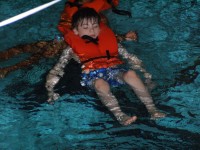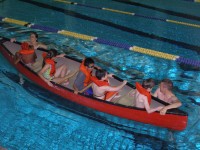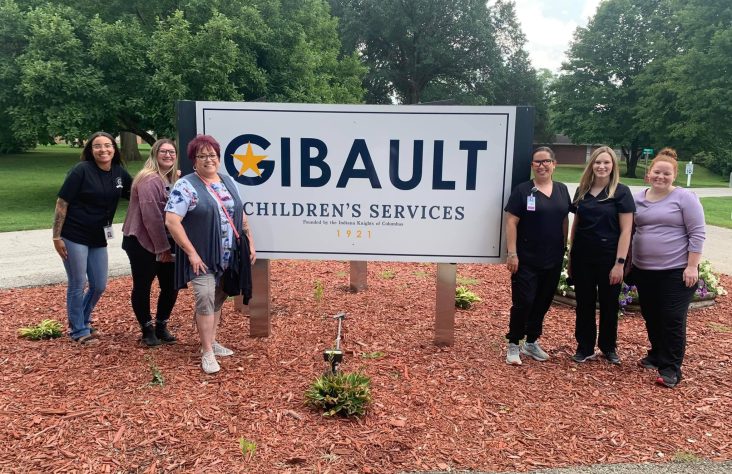June 9, 2010 // Local
Holy Cross students dip into water safety

Holy Cross student Joseph Leyes demonstrates the use of a flotation device in a back float position in the water.
By Lisa Kochanowski
SOUTH BEND — The fourth-grade students at Holy Cross School in South Bend did more than just memorize the Ten Commandments, master long division and learn about the various weather conditions affecting the United States for the last five weeks. They spent five Wednesday mornings practicing water safety at the University of Notre Dame’s Rockne Pool.
According to Susan Paeplow, physical education teacher at Holy Cross School, the goal of the program is for the students to develop the skills and knowledge for safety in, on and around the water.
“Unfortunately, many people lack the awareness required to recognize hazardous aquatic conditions or the skills necessary to get themselves or others out of danger in water emergencies,” said Paeplow, who has been holding this program for 11 years. “Having been an employee of the South Bend Parks and Recreation Department for over 20 years and having been a lifeguard and water safety instructor for nearly 30 years, water safety has always been of great importance to me. These are life skills we’re teaching. The idea for this course was formulated in conjunction with Paul McMinn of the South Bend Parks and Recreation Department who coordinated volunteers from their department, the South Bend Fire Department, including Chief Al Kirsits, whose children have all gone through this program, and the Department of Natural Resources, to help teach the class.”

Pictured are students from the Holy Cross Grade School’s fourth-grade class demonstrating boat safety in the water.
Paeplow feels water safety is important for children of all ages and chose the fourth-grade students to participate in this program because the children are becoming more independent at this age and they possess higher motor skills and the developing social skills necessary to understand and utilize the information and practices taught in this course. By fifth grade she finds that the students are eligible to participate in school sports, so the curriculum moves more toward developing skills and knowledge of sports and other activities in hopes that they will find activities that they can enjoy outside of the school environment.
“Including this program into the curriculum requires a lot of organization, including many schedule adjustments and arrangements for transportation and parent volunteers. Although the course takes a lot of planning to implement, the students are learning the physical benefits that water can provide and vital skills, which incorporate all of the physical education state standards for fourth grade,” said Paeplow.
Student Caroline Bueno learned many valuable skills during the class, including how to perform a human chain, how to get out if a person falls through the ice and how to save someone using a boogie board.
“I thought it was really, really fun because they were really nice to us,” said Bueno. “I learned CPR, what to do if someone else doesn’t know how to swim and if they get on your back how to get them off.”
Fourth-grader Brady Moore loved having the chance to be in the water and get out of school to do something unique and fun.
“I learned it’s important to wear a life jacket and if you’re in cold water you need to huddle together to stay warm,” said Moore.
Paeplow said the students learned a wide variety of things during their five weeks of classes. The skills taught included safe behavior in and around the water, proper use and importance of wearing a personal flotation device, basic swimming skills, floating, boating safety, how to conserve body heat when in cold water, helping themselves when in danger in the water, how to assist others in a water emergency and basic CPR skills.
“Our program’s motto is, ‘Think so you don’t sink,’” said Paeplow.
Paeplow said that if it wasn’t for the generosity of the University of Notre Dame for allowing the school to use the pool facilities and all the help from the parent volunteers, the program would not have been such a success.
“Through the general water safety information provided in this program, we hope the students have gained an awareness of causes and prevention of water accidents, a desire to be safe, and the skills to promote fun, healthy and secure water recreation. Each year, I have students who are non-swimmers or who are fearful of water and end up in the pool by the end of the program with smiles on their faces. That is what makes this program worthwhile and most rewarding,” said Paeplow.
The best news. Delivered to your inbox.
Subscribe to our mailing list today.






